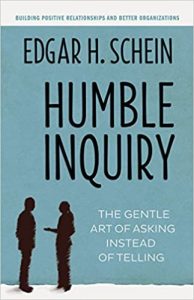Edgar Schein defines Humble Inquiry as “the fine art of drawing someone out, of asking questions to which you do not know the answer, of building a relationship based on curiosity and interest in the other person.”
In this book, Mr. Schein contrasts Humble Inquiry with other kinds of inquiry, shows the benefits Humble Inquiry provides in many different settings, and offers advice on overcoming the cultural, organizational, and psychological barriers that keep us from practicing it.
 As he says, communication is essential in a healthy organization. But all too often when managers interact with people, and especially those who report to them, they simply tell them what they think they need to know. As result, this behavior shuts people down. In order to generate bold new ideas, to avoid disastrous mistakes, and eventually develop agility and flexibility, the need to practice Humble Inquiry is necessary.
As he says, communication is essential in a healthy organization. But all too often when managers interact with people, and especially those who report to them, they simply tell them what they think they need to know. As result, this behavior shuts people down. In order to generate bold new ideas, to avoid disastrous mistakes, and eventually develop agility and flexibility, the need to practice Humble Inquiry is necessary.
In wondering why is it so important to ask questions, the book answers that in an increasingly complex, independent and culturally diverse world, one cannot hope to understand and work with people from different cultures if they do not know how to ask questions and build relationships that are based on mutual respect.
In fact, people must always keep an open mind and think that others might as well know things that they may need to know in order to get a job done. However, not all questions are equivalent, and the world needs to learn a particular form of questioning that can be acquired through Humble Inquiry.
As Mr. Schein explains “what is missing is a climate in which lower level employees feel safe to bring up issues that need to be addressed, information that would reduce the likelihood of accidents, and, in health care, mistakes that harm patients.”




























































